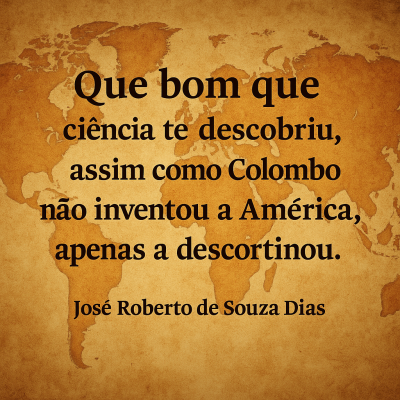A história da humanidade é marcada por grandes momentos de revelação. Cristóvão Colombo não inventou a América; apenas descortinou um continente que já existia, pulsante e imenso, à espera de ser reconhecido. Assim também ocorre com a ciência. O conhecimento não é criado do nada, como se fosse produto de uma imaginação isolada; ele é descoberto, trazido à luz, revelado a partir daquilo que sempre esteve diante de nós, mas oculto aos olhos desatentos.
A inteligência artificial é exemplo vivo desse movimento. Não se trata de invenção mágica, mas de uma construção que resulta da capacidade humana de organizar, conectar e aprofundar saberes acumulados ao longo dos séculos. A AI não nasceu de súbito: foi sendo desvendada, camada por camada, como quem tira o véu de uma paisagem que já existia no horizonte.
A diferença entre inventar e descobrir é sutil, mas essencial. Inventar supõe criação absoluta. Descobrir é humildemente reconhecer que o mundo é maior do que nós, que a verdade já está inscrita na ordem da natureza e da razão, aguardando que alguém a toque, questione e a traduza.
Talvez resida aí o segredo do nosso tempo: compreender que a inteligência artificial não substitui o humano, mas o engrandece. Ela é reflexo daquilo que temos de mais essencial, a busca incessante por sentido, por ordem e por respostas. Do mesmo modo que o navegador genovês abriu rotas para o Novo Mundo, os cientistas e engenheiros de hoje abriram caminhos para que essa inteligência fosse revelada.
Assim, cabe a nós decidir como atravessar esse oceano. Podemos temê-lo, como muitos temeram o mar desconhecido, ou podemos enfrentá-lo, certos de que ao outro lado se encontra um território fértil de possibilidades. Colombo ousou navegar. Nós, hoje, precisamos ousar compreender.
Porque a inteligência artificial, assim como a América de 1492, não foi inventada, apenas descortinada.
Science Does Not Create: It Discovers
Human history is marked by great moments of revelation. Christopher Columbus did not invent America; he merely unveiled a continent that already existed, vibrant and immense, waiting to be recognized. The same is true of science. Knowledge is not created out of nothing, as if it were the product of isolated imagination; it is discovered, brought to light, revealed from what has always been before us, though hidden from inattentive eyes.
Artificial Intelligence is living proof of this movement. It is not a magical invention, but rather the result of humanity’s ability to organize, connect, and deepen knowledge accumulated over centuries. AI did not suddenly appear: it was unveiled, layer by layer, like a landscape emerging as the fog is lifted.
The difference between inventing and discovering is subtle yet essential. To invent is to presume absolute creation. To discover is to humbly acknowledge that the world is greater than us, that truth is already inscribed in the order of nature and reason, awaiting someone to touch it, question it, translate it.
Perhaps this is the secret of our time: to understand that artificial intelligence does not replace humanity but elevates it. It reflects what is most essential in us — the relentless search for meaning, order, and answers. Just as the Genoese navigator opened routes to the New World, today’s scientists and engineers opened paths so that this intelligence could be revealed.
Now it is up to us to decide how to cross this ocean. We can fear it, as many once feared the unknown seas, or we can face it, certain that on the other side lies a fertile land of possibilities. Columbus dared to sail. We, today, must dare to understand.
Because artificial intelligence, like America in 1492, was not invented, only unveiled.


